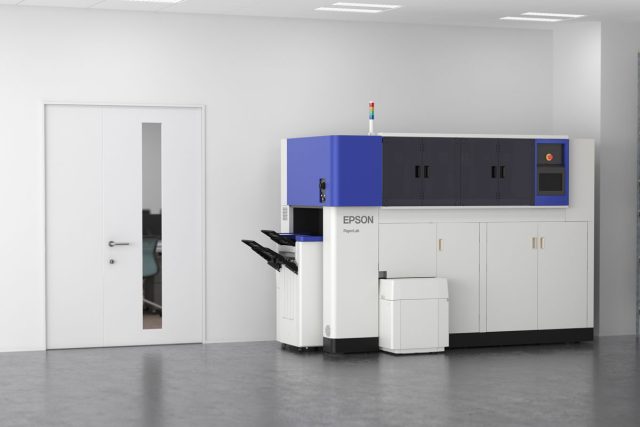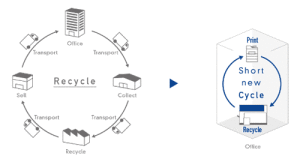Excellent! Not a big investment for a mid size office churning papers
[h=1]Epson unveils world’s first in-office paper recycling system[/h] [h=2]Waste paper goes in; 3 minutes later, sheets of new A4 paper come out—at 14 ppm![/h] by Sebastian Anthony (UK) - Dec 3, 2015 7:24pm IST
 Printer giant Epson has developed an in-office paper recycling machine. Called the PaperLab, you put waste paper in, and then new, bright white printer paper comes out. Epson says this process is more efficient than sending paper to an off-site recycling plant, and it's also much more secure: the PaperLab, which breaks paper down into its constituent fibres before building them back up into new sheets, is one of the most secure paper shredders that money can buy.
Printer giant Epson has developed an in-office paper recycling machine. Called the PaperLab, you put waste paper in, and then new, bright white printer paper comes out. Epson says this process is more efficient than sending paper to an off-site recycling plant, and it's also much more secure: the PaperLab, which breaks paper down into its constituent fibres before building them back up into new sheets, is one of the most secure paper shredders that money can buy.
[h=3]Further Reading[/h]
The specs of the machine are truly impressive. Within three minutes of adding waste paper to the PaperLab, it starts pumping out perfectly white sheets of new paper. The system can produce around 14 A4 sheets of paper per minute, or 6,720 sheets in an eight-hour workday. The PaperLab can also produce A3 paper, and you can tweak the thickness and density of the paper as well: if you want really thin white paper, that's cool; if you want thicker paper for business cards, it can do that too.
Epson says that the PaperLab is the world's first paper production system to use a "dry process." Paper-making processes usually require a lot of water, but the PaperLab requires only a tiny amount of water to "maintain a certain level of humidity inside the system," so it doesn't need to be plumbed into the mains. Presumably there's a small tank of water that needs to be filled up occasionally—hopefully with normal tap water, not £50-per-litre Epson Purified PrintXL Water.
As for how the PaperLab actually works, Epson (unsurprisingly) doesn't provide a whole lot of details. The key seems to be two processes: fiberising and binding. The fiberisation—the process of turning the waste paper back into its constituent long, thin cottony fibres—uses an "original mechanism," which presumably means it's patented and rather novel. How this is done without water, and in just a few seconds, we're not sure. There could be some kind of reusable solvent? In any case, this first step completely destroys any data that may have been stored on the paper.
Updated: An Ars commenter found an Epson patent, published in 2013, that describes one method of mechanically "crushing and defibrilating paper," and then using a cyclone of air to de-ink the crushed paper bits.
The second process is binding, where the fibres are stitched back together again. Epson says that different binders can be added to the machine, to create a variety of different papers: coloured papers, flame resistant papers, bright-white papers, or even fragrant paper. Where the fiberisation stage might feature a reusable solvent, the binding liquid will certainly need to be topped up.
 Enlarge / The standard paper life cycle on the left, vs. the PaperLab life cycle on the right.
Enlarge / The standard paper life cycle on the left, vs. the PaperLab life cycle on the right.
Finally, during a pressure forming stage, the paper's thickness, density, and size are decided.
That the PaperLab performs this process 14 times per minute is really quite awesome. Further, there could be some big energy and cost savings, both in terms of buying new paper, and the large amount of transportation involved in the usual recycling loop. Epson doesn't actually provide the total cost of ownership of the PaperLab, though, nor its energy consumption, so it's rather hard to say if the PaperLab is actually environmentally friendly—or just convenient.
The PaperLab will go on sale in Japan in 2016, with other regions possibly coming "at a later date." Epson hasn't said a word about price, but it'll likely be very, very dear (think £50,000+). A prototype of the PaperLab will be demonstrated next week at the Eco-Products 2015 conference in Tokyo.
This post originated on Ars Technica UK
http://arstechnica.com/information-...orlds-first-in-office-paper-recycling-system/
[h=1]Epson unveils world’s first in-office paper recycling system[/h] [h=2]Waste paper goes in; 3 minutes later, sheets of new A4 paper come out—at 14 ppm![/h] by Sebastian Anthony (UK) - Dec 3, 2015 7:24pm IST

[h=3]Further Reading[/h]

The specs of the machine are truly impressive. Within three minutes of adding waste paper to the PaperLab, it starts pumping out perfectly white sheets of new paper. The system can produce around 14 A4 sheets of paper per minute, or 6,720 sheets in an eight-hour workday. The PaperLab can also produce A3 paper, and you can tweak the thickness and density of the paper as well: if you want really thin white paper, that's cool; if you want thicker paper for business cards, it can do that too.
Epson says that the PaperLab is the world's first paper production system to use a "dry process." Paper-making processes usually require a lot of water, but the PaperLab requires only a tiny amount of water to "maintain a certain level of humidity inside the system," so it doesn't need to be plumbed into the mains. Presumably there's a small tank of water that needs to be filled up occasionally—hopefully with normal tap water, not £50-per-litre Epson Purified PrintXL Water.
As for how the PaperLab actually works, Epson (unsurprisingly) doesn't provide a whole lot of details. The key seems to be two processes: fiberising and binding. The fiberisation—the process of turning the waste paper back into its constituent long, thin cottony fibres—uses an "original mechanism," which presumably means it's patented and rather novel. How this is done without water, and in just a few seconds, we're not sure. There could be some kind of reusable solvent? In any case, this first step completely destroys any data that may have been stored on the paper.
Updated: An Ars commenter found an Epson patent, published in 2013, that describes one method of mechanically "crushing and defibrilating paper," and then using a cyclone of air to de-ink the crushed paper bits.
The second process is binding, where the fibres are stitched back together again. Epson says that different binders can be added to the machine, to create a variety of different papers: coloured papers, flame resistant papers, bright-white papers, or even fragrant paper. Where the fiberisation stage might feature a reusable solvent, the binding liquid will certainly need to be topped up.
 Enlarge / The standard paper life cycle on the left, vs. the PaperLab life cycle on the right.
Enlarge / The standard paper life cycle on the left, vs. the PaperLab life cycle on the right.Finally, during a pressure forming stage, the paper's thickness, density, and size are decided.
That the PaperLab performs this process 14 times per minute is really quite awesome. Further, there could be some big energy and cost savings, both in terms of buying new paper, and the large amount of transportation involved in the usual recycling loop. Epson doesn't actually provide the total cost of ownership of the PaperLab, though, nor its energy consumption, so it's rather hard to say if the PaperLab is actually environmentally friendly—or just convenient.
The PaperLab will go on sale in Japan in 2016, with other regions possibly coming "at a later date." Epson hasn't said a word about price, but it'll likely be very, very dear (think £50,000+). A prototype of the PaperLab will be demonstrated next week at the Eco-Products 2015 conference in Tokyo.
This post originated on Ars Technica UK
http://arstechnica.com/information-...orlds-first-in-office-paper-recycling-system/
